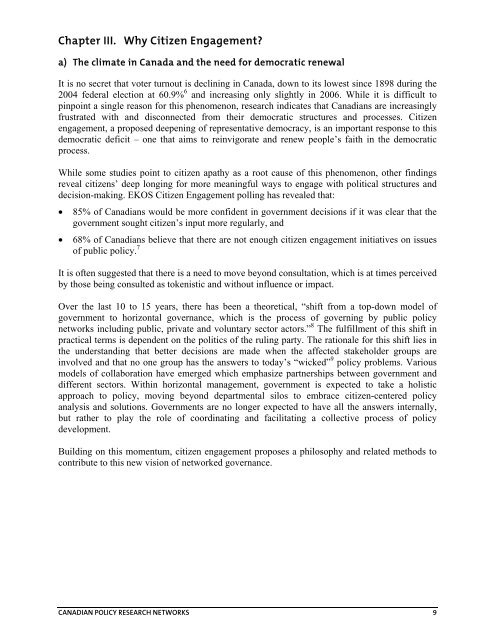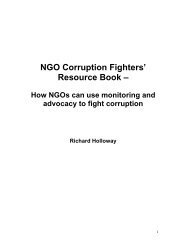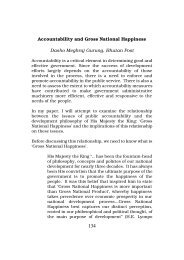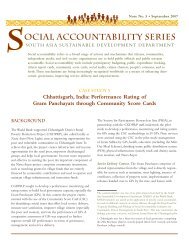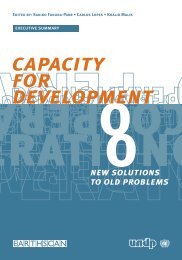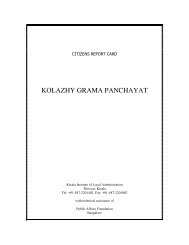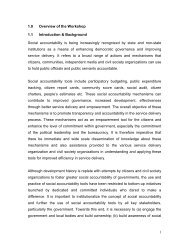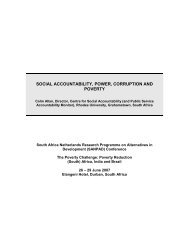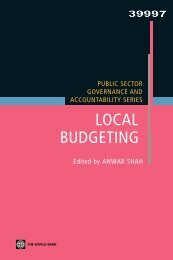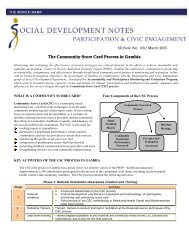Handbook on Citizen Engagement: Beyond Consultation - SASANet
Handbook on Citizen Engagement: Beyond Consultation - SASANet
Handbook on Citizen Engagement: Beyond Consultation - SASANet
- No tags were found...
You also want an ePaper? Increase the reach of your titles
YUMPU automatically turns print PDFs into web optimized ePapers that Google loves.
Chapter III. Why <strong>Citizen</strong> <strong>Engagement</strong>?a) The climate in Canada and the need for democratic renewalIt is no secret that voter turnout is declining in Canada, down to its lowest since 1898 during the2004 federal electi<strong>on</strong> at 60.9% 6 and increasing <strong>on</strong>ly slightly in 2006. While it is difficult topinpoint a single reas<strong>on</strong> for this phenomen<strong>on</strong>, research indicates that Canadians are increasinglyfrustrated with and disc<strong>on</strong>nected from their democratic structures and processes. <strong>Citizen</strong>engagement, a proposed deepening of representative democracy, is an important resp<strong>on</strong>se to thisdemocratic deficit – <strong>on</strong>e that aims to reinvigorate and renew people’s faith in the democraticprocess.While some studies point to citizen apathy as a root cause of this phenomen<strong>on</strong>, other findingsreveal citizens’ deep l<strong>on</strong>ging for more meaningful ways to engage with political structures anddecisi<strong>on</strong>-making. EKOS <strong>Citizen</strong> <strong>Engagement</strong> polling has revealed that:• 85% of Canadians would be more c<strong>on</strong>fident in government decisi<strong>on</strong>s if it was clear that thegovernment sought citizen’s input more regularly, and• 68% of Canadians believe that there are not enough citizen engagement initiatives <strong>on</strong> issuesof public policy. 7It is often suggested that there is a need to move bey<strong>on</strong>d c<strong>on</strong>sultati<strong>on</strong>, which is at times perceivedby those being c<strong>on</strong>sulted as tokenistic and without influence or impact.Over the last 10 to 15 years, there has been a theoretical, “shift from a top-down model ofgovernment to horiz<strong>on</strong>tal governance, which is the process of governing by public policynetworks including public, private and voluntary sector actors.” 8 The fulfillment of this shift inpractical terms is dependent <strong>on</strong> the politics of the ruling party. The rati<strong>on</strong>ale for this shift lies inthe understanding that better decisi<strong>on</strong>s are made when the affected stakeholder groups areinvolved and that no <strong>on</strong>e group has the answers to today’s “wicked” 9 policy problems. Variousmodels of collaborati<strong>on</strong> have emerged which emphasize partnerships between government anddifferent sectors. Within horiz<strong>on</strong>tal management, government is expected to take a holisticapproach to policy, moving bey<strong>on</strong>d departmental silos to embrace citizen-centered policyanalysis and soluti<strong>on</strong>s. Governments are no l<strong>on</strong>ger expected to have all the answers internally,but rather to play the role of coordinating and facilitating a collective process of policydevelopment.Building <strong>on</strong> this momentum, citizen engagement proposes a philosophy and related methods toc<strong>on</strong>tribute to this new visi<strong>on</strong> of networked governance.CANADIAN POLICY RESEARCH NETWORKS 9


